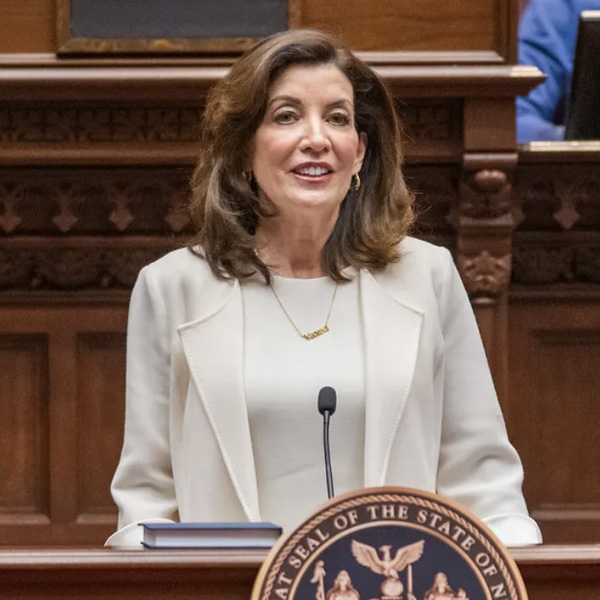

New York Gov. Kathy Hochul on Sept. 1 announced $6.5 million in funding to support research of innovative insurance policies or products that will promote the adoption of clean technologies.
The Insurance Innovation for Climate-Technology Solutions program will target insurance for residential and commercial renewable energy products that will both develop new business models and enable future climate technology solutions and be funded through the state’s 10-year, $5.3 billion Clean Energy Fund, according to the New York State Energy Research and Development Authority (NYSERDA).
A new program administrator will be awarded up to $1.5 million to create the program by working with insurance management experts to develop, fund and test innovative risk models that better address climate change. The remaining $5 million will be used for competitive grants expected to be announced in 2023.
The program will help overcome barriers to bringing new insurance products to the market in the face of increasingly costly extreme weather events. It is another step by the Hochul administration in support of New York’s 2019 climate and energy legislation, the Climate Leadership and Community Protection Act (CLCPA), the sweeping climate and energy initiative that calls for 70% of the state’s electricity to be generated through renewable sources by 2030 (70×30) and 100% through zero-emission means by 2040.
Many businesses have significantly re-evaluated their risk model projections to factor in the potential costs of coverage associated with climate change, especially the natural disasters that seem to be coming with greater frequency and cost. New York estimates that Hurricane Sandy caused $19 billion in damages and lost economic activity in New York City alone.
State Sen. Neil Breslin, an Albany Democrat who chairs the Senate Insurance Committee, said in a news release that the Innovation for Climate-Technology Solutions program “is critical for economic stability” because it will “enable businesses to better manage risk and prepare for the negative impacts climate change may have on them.”
NYISO Climate Vulnerabilities
NYISO recently assessed the impacts that climate change would have on the resilience and reliability of New York’s power grid.
The study found that climate disruptions could significantly reduce resource output during the winter, replacing fossil fuels would make meeting peak electricity demands more difficult, and better planning would make identified vulnerabilities more manageable.
Specifically, NYISO found that utility-scale battery storage would fill many of the reliability gaps created when carbon-fueled power generation is taken offline, which tracks closely with recent findings from Potomac Economics’ “Outlook” review.
Greater transmission capacity also will be needed to maximize renewable energy access, while dispatchable emission-free resources, such as green hydrogen, will be needed to act as load failsafes when intermittent renewable generators are taken offline because of meteorological disruptions.
Application Process
NYSERDA will competitively select a program administrator and is accepting applications from qualified organizations through Oct. 12. Applicants are asked to demonstrate economic benefits, and their proposals will be evaluated by a scoring committee.
Applicants must show how they can promote the research and development needed to bring new insurance products and services to market, including soliciting new insurance ideas, managing the development and growth of the program, and reducing risk for climate technology services.
